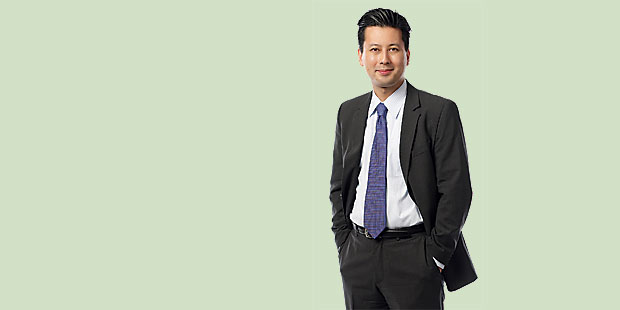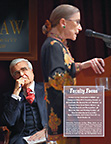Introducing Kenji Yoshino
Chief Justice Earl Warren Professor of Constitutional Law
Printer Friendly VersionWhen Kenji Yoshino started teaching at Yale Law School, he recalls a well-meaning colleague who offered him this advice: “You’ll have an easier chance at getting tenure if you’re a homosexual professional than if you’re a professional homosexual.” In other words, it was okay to be gay; just don’t flaunt it.
That counsel, which Yoshino eventually rejected, helped inspire his award-winning work. Covering: The Hidden Assault On Our Civil Rights (Random House, 2006) is a memoir that blends his personal identity struggles as a gay, Japanese American with legal arguments in order to question whether assimilation is always beneficial. “We have a deep-seated belief as Americans that we all should melt into the pot,” says Yoshino, a visiting professor for two years who joined NYU Law in July. “But if the demand for conformity is itself illegitimate, then assimilation is a symptom of discrimination rather than an escape from it.”
In Covering, Yoshino discusses three stages of coming out: “conversion,” “passing,” and “covering.” The latter two terms are adopted from the work of sociologist Erving Goffman. Conversion is the period in which a gay individual longs to become straight. Passing is the phase in which a gay individual has accepted his homosexuality, but hides it from society. And covering is a more subtle demand for assimilation, in which the individual is openly gay but feels pressured not to “flaunt.” Covering is as much an assault on a gay individual’s civil rights as the 1981 case in which an African-American woman was fired by American Airlines for wearing her hair in cornrows, Yoshino says. “His work gave us new categories for thinking about the types of discrimination that are relatively invisible to most people,” says David Golove, Hiller Family Foundation Professor of Law. “He’s had a major impact within constitutional and discrimination law.” In fact, Supreme Court Justice John Paul Stevens used Yoshino’s arguments, in part, to fashion a dissent from the Court’s 2000 majority ruling that the Boy Scouts of America could exclude gays. Yoshino also coauthored a key amicus brief in Lawrence v. Texas, the 2003 case that struck down sodomy statutes across the country. “He is a superb lawyer who has reshaped anti-discrimination law by making us understand how forcing people to ‘cover’ diminishes their authenticity and personhood,” says Yale Law School Dean Harold Hongju Koh.
Yoshino also discloses in his book his own identity struggles. As a first-generation American, Yoshino felt uncomfortable assimilating while growing up. His father, a professor at Harvard Business School, and his mother, a homemaker, raised Yoshino and his older sister in a suburb of Boston. Yoshino attended Phillips Exeter Academy, and he and his sister spent summers in Japan attending public school “to inhabit a Japanese body—to rise, to straighten, and to bow: to sit ramrod straight in my high collared uniform,” he writes.
His parents would tell Yoshino and his sister to be “100 percent American in America, and 100 percent Japanese in Japan.” He says his sister, who now lives in Tokyo, as do his parents, perfected these independent cultural identities in a way he never could. “I think in many ways my exposure to an extremely conformist culture in Japan fueled my understanding of assimilation long before I had any consciousness of being gay,” Yoshino explains.
Until he was a young adult, he says he was stuck in the “conversion” stage. After graduating summa cum laude with a degree in English literature from Harvard in 1991, he earned a Master of Science in management studies at Oxford in 1993, on a Rhodes Scholarship. While at Oxford, though, he says, “I routinely went to the college chapel and prayed to the god I didn’t believe in to be straight.” At 22, he came out to his parents, but when he attended Yale Law, he continued to “pass” as straight to classmates. By the time he received his J.D. in 1996, he was openly gay, yet he acceded to his colleague’s covering demands—to write about and teach nongay topics—until he couldn’t dissemble any longer.
He joined the Yale faculty after clerking for judge and former Yale Law School Dean Guido Calabresi of the U.S. Court of Appeals for the Second Circuit. (He earned tenure at Yale in 2003 and became the inaugural Guido Calabresi Professor of Law in 2006.) Also a deputy dean for intellectual life, he coordinated the non-curricular academic life of the law school, such as scheduling workshops and student fellowships.
Currently, Yoshino is working on an article called “The New Equal Protection,” in which he proposes shifting the legal paradigm from group-based equality to one that protects liberty for all. He argues that the samesex marriage debate, for instance, should be framed not as the right of gays to be equal to straights but as the right of all people to marry the person they love.
His English lit background continues to shine through Yoshino’s work. NYU University Professor Carol Gilligan, who cotaught a Shakespeare seminar with Yoshino, says: “You can’t read [Covering] without being stunned by the sheer poetry of his writing.” Drawing on his seminar with Gilligan, Yoshino is writing a book tentatively called Shakespeare’s Law, in which he pairs five sets of Shakespeare’s plays to show how the Bard argues both sides of fundamental questions of justice.
Yoshino, meanwhile, is eager to settle in at NYU. “It’s important for people at some point to get away from their teachers, in the same way that you break from your parents,” says Yoshino. “I came for the city, then I stayed for the school. I really fell in love with this institution.”
—

